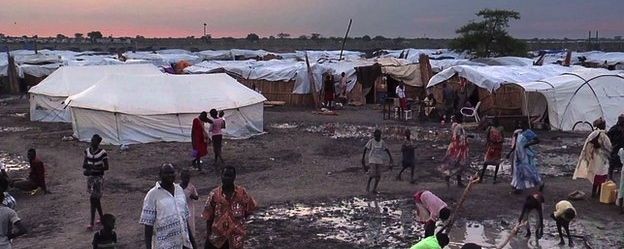Back-and-forth fighting over the town of Bentiu in South Sudan has forced huge crowds of people seeking protection into an inadequately sized UN base where there is not enough food, water, latrines, shelter or space.
The situation is considered ‘dire’. Fears of violence in two other cities that earlier saw fighting, Juba and Malakal, have likewise trapped tens of thousands of people into UN bases where conditions are worsening owing to rainy weather.
OCHA, the UN humanitarian coordination office, released a situation report on Saturday covering the period 26 April to 2 May. The information below represents a selection of highlights from the report:
In Bentiu, the number of people seeking protection in the UN base rose from 8,000 on 15 April to approximately 25,000 by 1 May. Aid workers are trying to provide enough food, medical care, water and sanitation services. With severe overcrowding, however, conditions inside the UN base are “dire”, with a shortage of water for bathing and drinking.
In Malakal, the rains worsened the humanitarian situation of 18,000 displaced people living in ‘congested conditions’ inside the flood-prone UN base. Clean drinking water is inadequate, sanitation conditions are poor and there is an increasing risk of epidemics.
There are reports of gender-based violence in Malakal and the nutrition situation at the base is also problematic. Also the lack of adequate shelters is increasing health risks.
Sanitation agencies say they achieved minimum emergency standards for water supply at ten different sites, but they reported less progress in meeting minimum standards for latrines per person because of overcrowding at the UN protection sites. They are making preparations for possible cholera outbreaks.
Food insecurity in Upper Nile, Unity and Jonglei continues to deteriorate due to disruptions of relief supplies by both air and by road. WFP has resorted to airlifts and airdrops of food supplies. Mobile food distribution teams were deployed to Lankien, Motot, Pibor, Pochalla, Bor and Haat, as well as Ulang in Upper Nile and Ganyiel in Unity.
A surgical team was deployed from the Juba Teaching Hospital to Rumbek Hospital to support surgical operations following a spike in arrival of new casualties.
Medical teams were unable to access Ayod and Renk, Upper Nile, to provide health services due to insecurity.
74,118 people were vaccinated against cholera at the UN bases in Juba, Mingkaman, and Malakal. 32,681 meningitis vaccinations were conducted in Mingkaman.
Humanitarian officials completed a workshop on food security classification and are preparing their findings for public release.
Related coverage:
Key humanitarian updates (19 Apr.)




